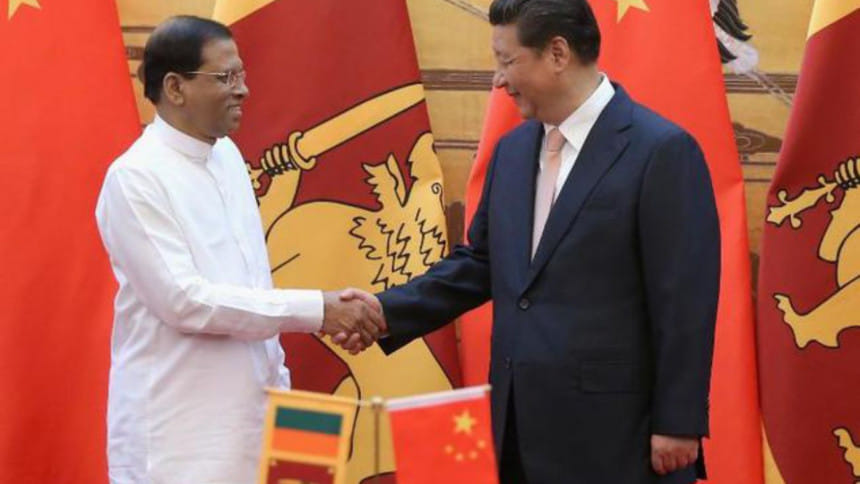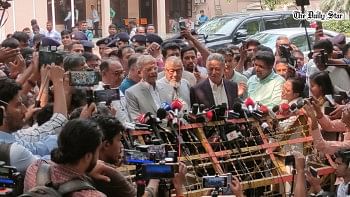Sri Lanka balances its ties with two Asian giants

SRI Lankan President Maithripala Sirisena on 25th March began a four-day visit to China to rebalance Colombo's close ties with Beijing amid reports he might seek to renegotiate the 'expensive' Chinese loans and discuss the future of the suspended $1.5 billion Colombo Port project.
Sri Lankan Foreign Minister Mangala Samaraweera who visited China last month to pave the way for Sirisena's visit had said his government would bring Colombo's foreign policy back to centre, meaning pursuing good relations with all the countries, including China, India and the US.
Sirisena's surprise election win presented a diplomatic challenge to Beijing as it seeks to expand its political and economic influence in the Indian Ocean region.
On his first visit to China after boosting ties with India with back-to-back visits by him and Prime Minister Narendra Modi, Sirisena held talks with his Chinese counterpart Xi Jinping on 26th March during which the two leaders reportedly discussed the future of five billion dollar Chinese loans which Colombo said were borrowed at high interest rates by previous President Mahinda Rajapaksa. The project was regarded key to the implementation of Xi's pet Maritime Silk Road project in the Indian Ocean.
The two Presidents witnessed in Beijing the signing of agreements on healthcare, construction and urban development.
Chinese Assistant Foreign Minister Liu Jianchao told the media after the talks that the two leaders agreed to strengthen trilateral cooperation between China, Sri Lanka and India. "The three are all important countries in the region. It will be really beneficial for the three counties to have cooperation in the areas like economic and social development. It is part of the China and South Asia cooperation," he said.
Being equidistant from East Asia, the Middle East and Africa, Sri Lanka is an important component of Xi Jinping's "New Silk Road" strategy of increasing China's economic ties with neighbours to the west and southeast.
Ever since Sirisena came to power defeating Mahinda Rajapaksa in January's presidential elections, Beijing has had to deal with a series of setbacks as Chinese-backed projects have come under scrutiny for their links to corruption-tainted Rajapaksa.
Since a major driver of the New Silk Road policy is developing the backward and landlocked western areas in China by integrating them with the rest of the region, oil supply routes through the Indian Ocean can only be expected to get busier.
The docking of two submarines last year at a Colombo terminal built by Chinese companies is said to have been the last straw in India's relations with Rajapaksa. China's increasing activity in Indian Ocean is putting it on a collision course with India and the US, who are alarmed at its growing engagement with countries like Sri Lanka and its forays into the waters it used to leave alone.
"Sri Lanka needs good relations with both China and India but Rajapaksa turned it into a zero sum game, which made him a liability for India," said Paikiasothy Saravanamuttu, executive director of the Centre for Policy Alternatives in Sri Lanka.
The new Sri Lankan government has made it clear that its foreign policy will be a balanced one between India and China. Seeking to pursue a balanced, non-aligned foreign policy that neither annoys nor pampers any nation. A nation has to pursue its policy which advances its national interests and Sri Lanka does not wish to fall within the political orbit of China against India.
It is noted that Sri Lankan President Maithripala Sirisena made his first overseas trip as president to India in February, apparently indicating a willingness to revive the cooperative relationship. Sirisena signed a deal to receive training for Sri Lanka's civilian nuclear program. India's state-run National Thermal Power Corp. is expected to start work on a 500-megawatt thermal power plant in Trincomalee, a port on the eastern coastline.
Commenting on Sirisena's visit, Chinese Foreign Ministry spokesperson Hua Chunying told a media briefing here that China respected the recent decision made by Sri Lanka.
It is worthwhile to note that both China and India can help the goal of Sri Lankan national interest in a better fashion and people of Lanka are able to improve their lives as being the chief beneficiaries of the new government. This being the case, observers say that it will not be easy for Sri Lanka to sever all ties with China. Sri Lanka needs Chinese investment for its economic development and it would be interesting to see how Sri Lanka balances its relation with India and China.
China has been watching closely the new government policy in Sri Lanka. China is in no mood to make any hasty decision in relation to Sri Lanka. China is aware that any government in Colombo will want China's monetary help. China has the capacity to help Sri Lanka make full use of its geographical advantage.
The writer is former Bangladesh Ambassador to the UN, Geneva.

 For all latest news, follow The Daily Star's Google News channel.
For all latest news, follow The Daily Star's Google News channel. 



Comments